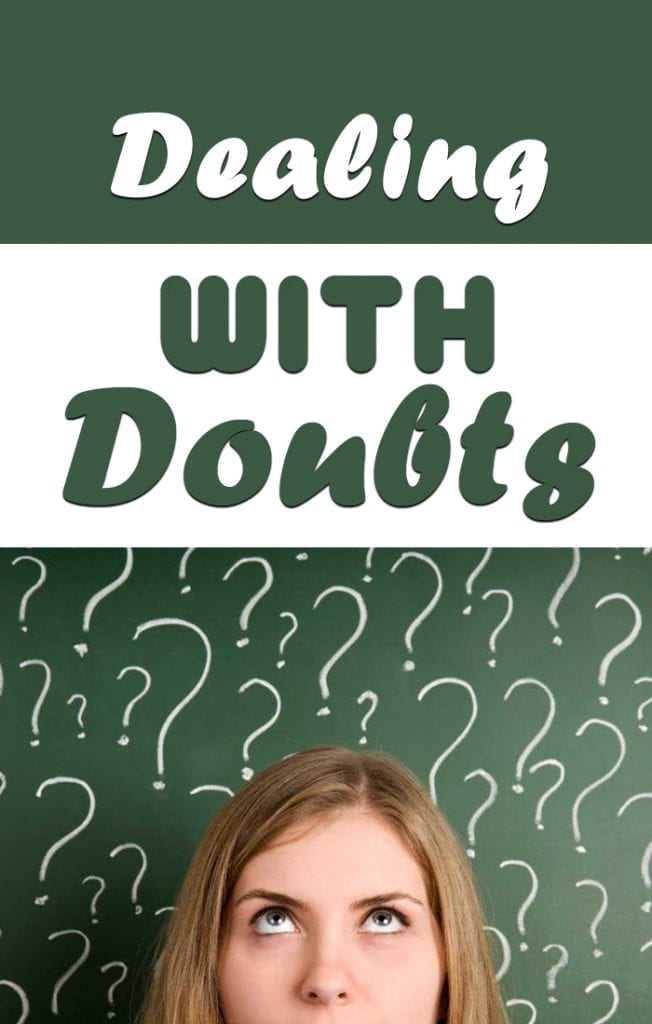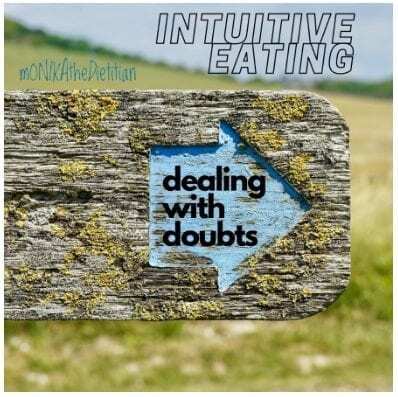Hi there,
I’m MonikaTheDietitian. Guest posting today here on Eating Enlightenment!
Like Jared, the author of this blog, I specialize in revitalizing and repairing food relationships through the process of Intuitive Eating, except I’m in Canada and he’s in sunny California. Otherwise we share the same philosophy!
Recently, Jared and I teamed up to unpack some misconceptions about the Intuitive Eating approach.
Have a bounce back to my blog to read Jared’s exploration of the misconceptions that people often have at first glance into Intuitive Eating: Intuitive Eating: Misconceptions
I thought I’d contribute to the same conversation by looking at some practical steps to take to work through those automatic doubts that Jared identified.
DOUBT #1: LOSS-OF-CONTROL
“Eat what I feel like eating? Then I’ll just binge on ice cream, pizza and cookies all day!”
Jared rightly explained that it’s not about food anarchy, just wiggle room.
But since Intuitive Eating is founded on unconditional permission to eat, the idea of allowing yourself your forbidden foods likely evokes a sudden panic of losing control, gaining ungodly amounts of weight, and ending up worse than you started.
What we need here, beyond the experienced reassurance that this is not what happens when people authentically begin practicing Intuitive Eating, is to rekindle some TRUST in your own human and biological nature.
Trust, unfortunately, is not something anyone can talk you into.
But trust will build with keen observation of your own outcomes.
We humans tend to zone out and miss the details of our daily experiences, and then we tend to remember the negative moments while not noticing when things actually go right.
So, to begin counteracting the paralyzing doubts that keep us stuck in the same old unproductive food cycles, we must activate our attention to start noticing what actually happens on the other side of eating events. We’re usually so wrapped up in the anticipation of eating, and then in the negotiation of guilt or the frenzy of the eating moment, that we don’t notice the “after effect”.
The post-food check-in allows you to acknowledge that once you’ve had your fill, the craving quiets down.
It also shows you that if you’ve had too much, your appetite responds by turning down the volume over the next few days or food events. In short, observing what happens after eating provides personal evidence that the body does in fact have natural stopping cues and that the appetite does downregulate when we allow ourselves to get satisfied.
Such evidence gradually builds the confidence that we can trust ourselves around food; that trust allows us to step down the constant vigilance driving the vicious cycle of guilt/obsession that is the real culprit of loss-of-control with eating.
DOUBT #2: SNOW-FLAKERY
Another anxiety Jared pointed out was that “Intuitive Eating can seem like something hippies do”.
And sometimes this is exactly what keeps us from making the changes we need to make, the reflexive resistance to being lumped in with a group of people with whom we don’t really identify.
This is sort of a stigma of our own creation. So often we miss out on exploring new territory that could be life-changing because we’re stuck in entrenched stories we tell ourselves that keep us safely embedded in our familiar social group, even if it’s perhaps not the best place for us to be.
To work with this fear, it takes awareness too, but this time we need to pay attention to our self-talk.
In order to break out of stale and repetitive thought patterns, we must catch the thoughts that hold us back. As soon as you find yourself thinking the “I don’t want to be one of those people” thoughts, try questioning this reflex. What’s the worst that can happen in trying on a new perspective? Do ‘those’ people seem to be experiencing something you’d like a piece of, yourself?
It’s powerful to play the devil’s advocate with yourself and to think about the new possibilities that might open up to you if you ease up on the auto-judgement. Do you want to keep towing the party line? Or do you want to leave the door open to change?
If you’re interested in actually doing something differently, there’s no getting around the need to examine your automatic thoughts and knowing whether they’re working for you, or against you.
DOUBT #3: THIS FEELS WRONG
As Jared explained in the Misconceptions article, this is going to get uncomfortable.
Sometimes people that I work with on Intuitive Eating struggle to let go of the rules, because it might feel like they’re in freefall for a while, which is disconcerting.
Other times people begin intuitive eating assuming it will be easy to not have to diet anymore, and then they panic when we start practicing without the safety net of portion sizes and finger wags. That panic is unpleasant.
If you feel yourself squirming at the thought of losing black-and-white direction, or struggling with the physical and mental angst of having ‘overdone it’, here are 2 action steps to take.
- Grounding: When you feel untethered, you will want to revert to familiar habits, regardless of how unhelpful they may have been. To stay the course and move forward, identify those panicky moments as they happen, then get out of your head by stepping into your body.
At the core of the Intuitive Eating framework is the acknowledgement that the body knows what it’s doing better than we do. If you overeat and feel it physically, it is a sure sign that your body does have a food regulation system independent of your thinking brain.
The point is not to pass a test to never overeat; the point is to get better at noticing the body cues earlier and earlier. If you can feel the effects of too much food or too little food, focus in on those sensations without judgement and to watch them change. Make it your mission to get better and better at responding to those physical cues at the right time, no thinking involved.
It’s just you and your biology, and the more interested you become in the physical sensations, the less you’ll need the safety blanket of food rules and diet guidelines that are one-size-fits-all.
- Learning from Failure: It’s hard not to feel the icky regret of having gone too far. Again, when people find themselves overeating as they experiment with responding to body cues and instincts, they often want to quit the experiment. But this process is not a test, it’s learning.
The productive next step after feeling ‘failure’ is figuring out ‘why’ and ‘what was learned’.
No one ever learned any skill by doing it once. There will be many slips along the way, but these are not signs that something isn’t working, they’re just the growing pains of progress.
Understanding the circumstances that set you up to misfire will give you insight into your vulnerabilities and allow you to be better equipped next time.
Sit with the feeling; notice all the physical sensations and watch them change. And while you’re doing that, identify what you can aim to do differently next time. Then notice when you make progress.
AWARENESS
The practical steps to take in the face of anxiety or fear of eating intuitively are all linked by a common thread of awareness.
We need to build trust that the systems are actually going to work as they should by noticing satisfaction and appetite downshifts as they happen.
Likewise, we must catch and release the thoughts that keep us stuck.
We can acknowledge the unpleasant sensation and outcomes to put them into perspective.
Luckily, this sort of awareness can start before you make any sort of changes or commitments at all. It’s a no-risk proposition, really. If you’re curious about Intuitive Eating, but not ready to take the leap, then let’s just start with awareness of how your appetite changes in response to meals, how your self-talk is helping or holding you back, and how your body can give you feedback about how much to eat and when.
This is a guest post written by MonikaTheDietitian. Monika writes about Intuitive Eating, Food & Mood, and Food Decisions in the Food State of Mind Blog over at NutrtitionREALIZED.com.




